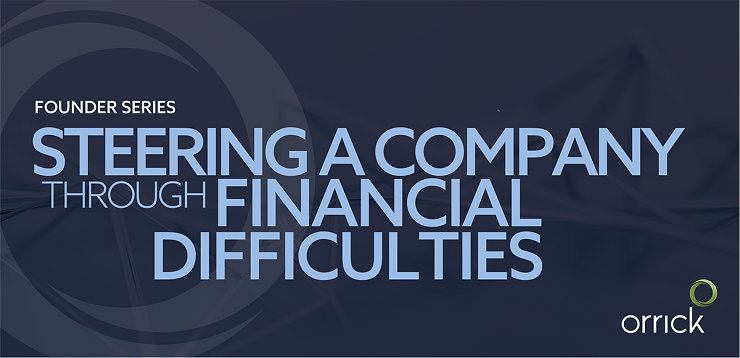Founder Series: Top Tips to Follow When Flipping to a Delaware Corporation
9 minute read | January.26.2023

11 minute read | April.27.2023
Orrick's Founder Series offers monthly top tips for UK startups on key considerations at each stage of their lifecycle, from incorporating a company through to possible exit strategies. The Series is written by members of our market-leading London Technology Companies Group (TCG), with contributions from other practice members. Our Band 1 ranked London TCG team closed over 320 growth financings and tech M&A deals totalling US$9.76bn in 2022 and has dominated the European venture capital tech market for 7 years in a row (PitchBook, FY 2022). In our previous instalments, we have guided founders through the process of incorporating a private limited company, building their team, how to use share options to attract and incentivise their employees, protect their ideas, identified key compliance considerations, what to consider when raising their round, and how to navigate the evolving cyber threat landscape, how to flip to a Delaware corporation, how to steer a company through financial difficulties and what to consider when raising bridge financing.
As a new founder, becoming a director often comes with questions and concerns: what additional duties are you now subject to, what processes and procedures can you put in place to ensure that you are complying with your duties, and what does directors’ personal liability mean? In the eleventh instalment of Orrick's Founder Series, our Technology Companies Group outline key considerations in your role as director and the ways in which you can mitigate the risk of breaching your directors’ duties.
Directors should therefore read board papers and reports in advance of meetings and be prepared to discuss and question them.
Complying with directors’ duties is crucial, as a breach of general duties may, in certain circumstances, be grounds for termination of an executive director’s service contract, lead to disqualification, or cause company directors in breach to be characterised as acting in bad faith. The company could, for example, seek damages where a director has been negligent or rescind a contract in which the director had an undisclosed interest.
As a director, you will also have certain administrative duties, such as the duty to keep the company’s statutory books up to date, file returns, and to consider the interests of the company’s creditors (especially where there is a possibility of insolvency). These general duties are owed to the company, and therefore only the company will be able to enforce them (except in limited circumstances where shareholders could bring a derivative claim for breach of duty on the company’s behalf). Our UK Corporate Solutions team can take on the administrative burden of making your Companies House filings and maintaining your registers so that you can focus on building your startup.
If prior to the start of the winding up of a company, a director knew or ought to have concluded that there was no reasonable prospect that the company would avoid going into insolvent liquidation, they may also be liable under the IA 1986 to make a contribution to the company's assets on its winding up.
Directors should keep minutes of board meetings which record the decisions made by the board. These will form part of the evidence that the directors acted appropriately. The directors should also frequently monitor the finances of the company by reviewing the management accounts. We unpack the topic of wrongful and fraudulent trading in greater detail in the ninth instalment of the Founder Series (Top Tips on How to Steer a Company Through Financial Difficulties) here.
Directors should make sure appropriate policies are in place in the employee handbook to ensure proper processes are followed to avoid any potential claims of discrimination. We talk more about the policies and procedures you should look to implement in your company in our second instalment of the Founder Series (Top Tips to Follow When Building Your Team) here.
A director convicted of a breach can also be disqualified from holding a director position for up to 15 years.
Directors should make sure appropriate policies are in place in the employee handbook to ensure proper processes are followed to avoid any potential claims. We talk more about the policies and procedures you should look to implement in your company in our second instalment of the Founder Series (Top Tips to Follow When Building Your Team) here.
Where a company (and not merely individuals acting on its behalf) is convicted of an offence under (a) to (c) above, its directors can be held liable jointly with the company. The directors would have to have consented to the bribery to be prosecuted. A director found guilty of any of these offences could face a maximum penalty of 10 years imprisonment and/or an unlimited fine. A director convicted of bribery could also face disqualification from holding a director position for up to 15 years.
Whilst this offence relates to the company rather than directors individually, the board needs to be satisfied with the company's overall approach to preventing bribery.
Directors should ensure that adequate procedures are in place to protect against bribery and corruption offences.
If the company already has insurance in place, a new director should ensure that the insurer is aware of their appointment and confirm that they will be covered by the policy.
The articles of association of a company usually permit the company to indemnify directors. However, the indemnity itself must be contained in the director's service contract or a standalone deed of indemnity.
Any indemnities given to directors have to be disclosed each year in the directors’ report that accompanies the audited accounts of the company, and their terms have to be available for inspection by shareholders at all times.
A director may also apply to the court for relief where they have reason to expect that a claim may be made against them.
Our London TCG practice reflects London’s role as one of the world’s leading financial markets and a centre for international commerce. Nothing inspires us more than helping tech companies develop novel strategies and push boundaries. Through our extensive client portfolio, deal volume, and relationships in the tech ecosystem, we provide commercial and legal insight to each company’s strategy. We work with tech companies on all aspects of their business plans, financing strategies, protecting intellectual assets, retaining talent, securing and monetising data, and advocating for innovation-friendly public policy.
If you would like more details on any of the issues above, please contact Jamie Moore.
9 minute read | January.26.2023

12 minute read | February.23.2023
